A shortlist of five finalists for the 2017 Wolfson Economics Prize, the second largest economics prize in the world after Nobel, has been unveiled today, 27th April 2017.
Shortlisted finalists include a recent graduate from UCL; an Australian start-up firm; a former lawyer; an economist and her husband, the President of the Automobile Association (the AA); and an Economics consultancy. Each shortlisted finalist will be asked to expand their submissions before the final and if they do so will be awarded £10,000. The judges also recognised two entries with “Lightbulb Awards” for originality.
Finalists
Full details on all the finalists can be found below (click + to expand details):
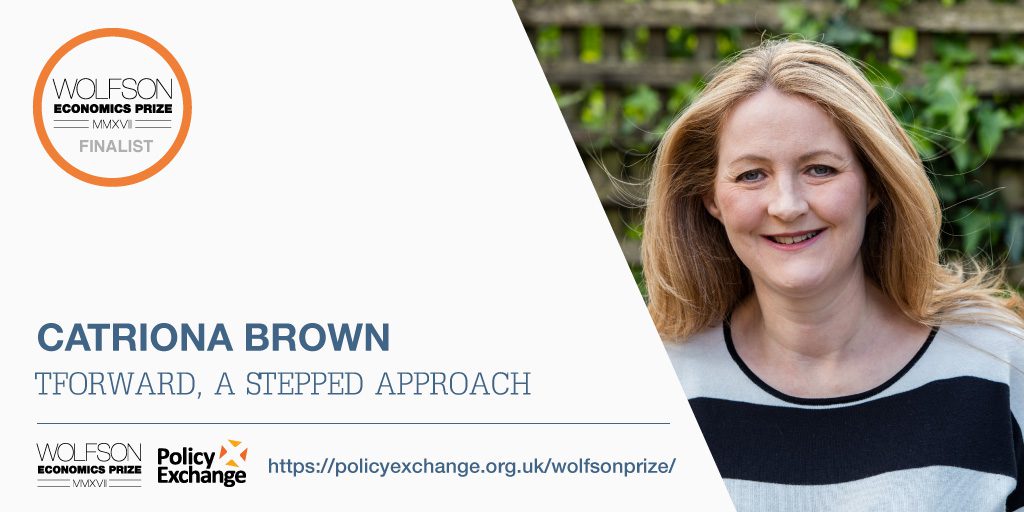
Download Full Submission
Catriona’s entry argues that a rapid shift to a single national plan for road pricing would fail in the face of political and technical objections. Instead she backs greater investment in roads through a gradual process, starting with the intelligent upgrading of existing charging systems such as the London Congestion Charge and the HGV levy on trucks. Local authorities would be encouraged to take part through deals with central government, sorting out congestion hotspots and potholes. She suggests new roads could be funded and integrated into this system, which she calls T-forward. Electric and autonomous vehicles would also be included and their spread would support a bigger shift. It would be possible, she argues, to include public transport in the payment system, making it simple for people compare ways to travel.
Her big idea
No one will be forced to use road pricing, but investment will grow.
Biography
Catriona is a busy mother with two young children, and expecting her third child next week. Catriona does not have a professional background in transport, but her everyday frustrations with road congestion have motivated her to draw on her background as a lawyer to find solutions.
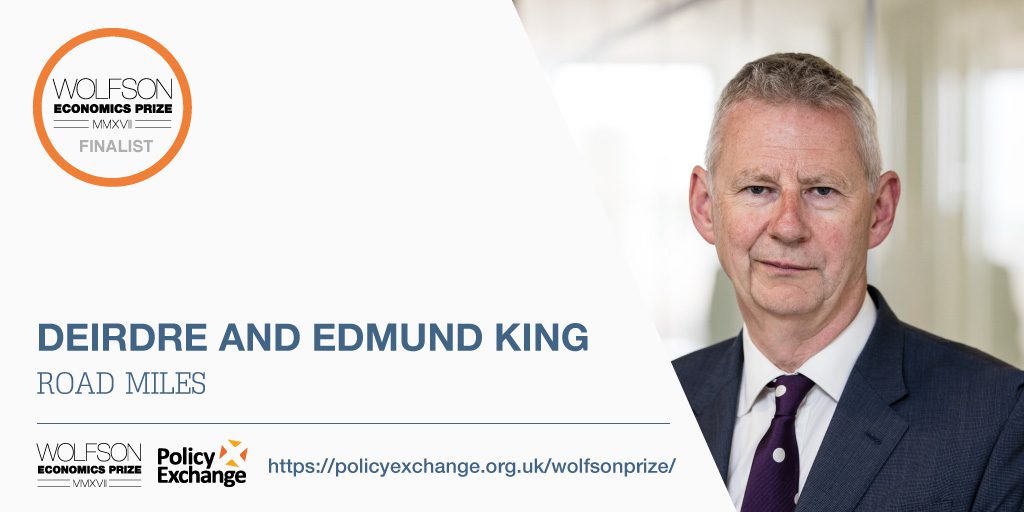
Download Full SubmissionDeidre and Edmund King’s entry calls for a new and popular way of charging for driving, to encourage investment and deal with changing technology. They argue that the current system gives road users a raw deal: they pay some of the highest taxes in Europe but the road network is congested and deteriorating. This entry focuses on winning support for road pricing by offering all drivers at least 3,000 free road miles each year – with a small charge for distances travelled after that and extra free miles for rural drivers who need to travel further. Foreign drivers would pay a daily fee to use the UK network. Their entry suggests car makers could offer deals to purchasers, including extra road miles in the same way they offer insurance. A national lottery could offer more – as could businesses such as supermarkets to reward shoppers. Meanwhile fuel duty would drop from the current 58p a litre to 47p within five years and the system could produce more than £3bn a year for extra investment in roads.
Their big idea
Road miles become a new currency.
Biographies
Deirdre King serves as a director of Blueprint Consultants, and formerly worked as an economic business analyst for BSkyB and BBC Worldwide. She has also served as an economist at the British Road Federation. She holds an MSc in Economics from LSE and a BSc in Economics from UCL.
Edmund King has 25 years’ experience as a transport and motoring campaigner. He has worked for the British Road Federation and various motoring organisations and think tanks. He is Visiting Professor of Transport at Newcastle University and the AA president. Last year he received an OBE for services to road safety.
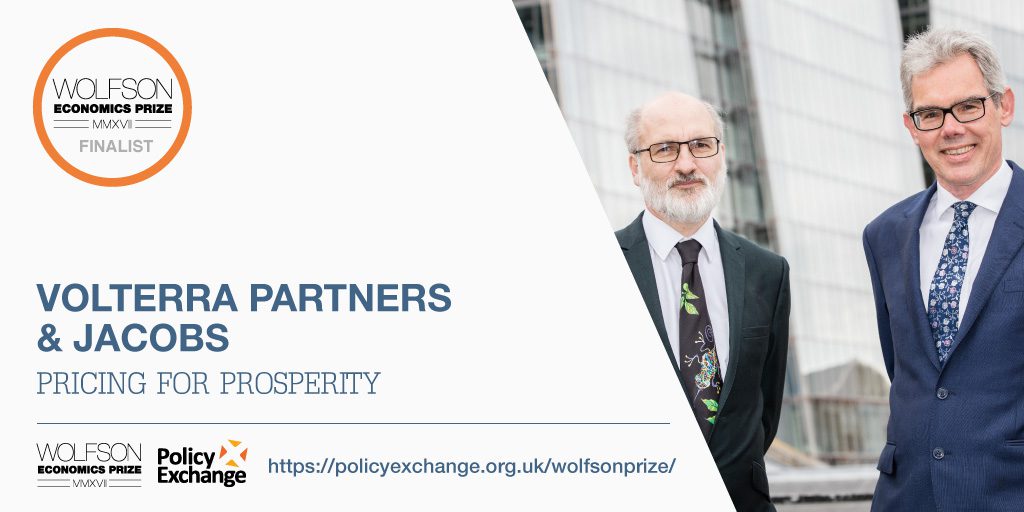
Download Full Submission
The Volterra and Jacobs’ entry, led by Paul Buchanan, sets out the challenge facing the UK: our road network is one of the most congested in the developed world and needs improvement as our population and economy grows. They argue of all the solutions – including increasing fuel duty to cut demand, rationing car use or relying on technological change such as autonomous vehicles – only a new form of charging is flexible enough to solve the problem. Most drivers will get a much better service for a lower price. They propose a gradual transfer to a new system which would make charges and journey times clear in advance and compensate for delays. This would be achieved through a shift from the current system of very high fixed costs for car ownership, and low marginal costs, to a new system which would rebalance the current average cost of car ownership and use, currently £4,220 a year. The costs of road congestion, road maintenance and environmental mitigation would be made clear, allowing resources to be put into solving them. This would help deal with issues such as air quality, encourage new car technology and sort out congestion and poor maintenance.
Their big idea
Most drivers will gain and if you are late you’ll get your money back.
Biography
Paul is an economist specialising in the transport sector. Paul has led many major project appraisals including Jubilee Line Extension and Crossrail. He has extensive overseas experience. Paul led the development of Wider Economics from Crossrail from 2002 to 2005, subsequently incorporated into DfT guidance. He is a partner at Volterra.
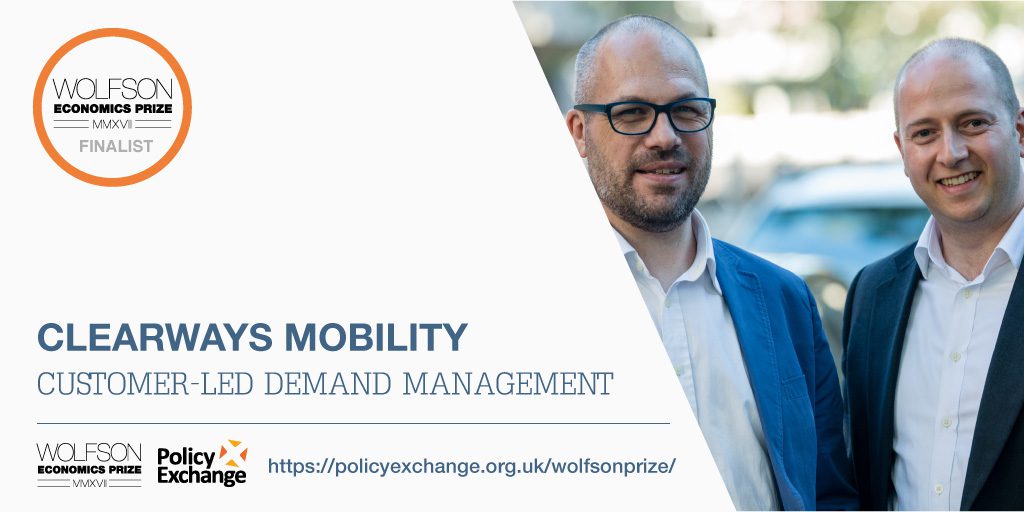
Download Full Submission
According to Jamye Harrison & Russell King, congestion is getting worse and government revenues from roads will fall: a combination that spells bad news. The answer, they say, is a new pricing system but the political difficulties are obvious. How to solve this? Don’t force people to take part – make it worth their while instead. They propose a voluntary switch to pricing in return for a cut in fuel duty, using established retail brands to win customers. Road users who decide to take part can save money by avoiding peak congestion and will pay less for their fuel. They believe a one-off pricing system from central government is bound to fail. Instead they suggest starting small with a trial scheme and bringing on board established private sector businesses from retail, transport and the car industry to work with customers. Electric vehicles would be included in the new system automatically – and as vehicle technology evolves, the scheme can adapt too.
Their big idea
No one will trust Government to bring in a better way of paying for better roads, so work with others.
Biographies
Jamye Harrison has over 20 years of experience in strategy, design and delivery spanning customer experience, technology and business architecture. He is a former Partner with Deloitte in Australia where he led the firm’s national Transport practice. As Co-Founder of Clearways, Jamye is passionate about addressing traffic congestion along with integrating our roads with broader transport networks – ultimately enabling people and goods to move easily through cities and regions. Jamye is an Adjunct Professor at the University of NSW in the Faculty of Engineering’s Research Centre for Integrated Transport Innovation and Chair of the Transport Taskforce at the Committee for Sydney – an independent policy think tank.
Russell King’s experience spans policy development, strategic planning and program delivery in transport, education and financial services. For more than 20 years Russell has pursued a passion for economic and social policy reform, most recently in Sydney as Policy Director for the NSW Minister for Transport & Infrastructure. As a Cabinet Member for Strategic Planning & Transport at Wandsworth Borough Council, he led significant policy innovation and service delivery reforms in inner London.
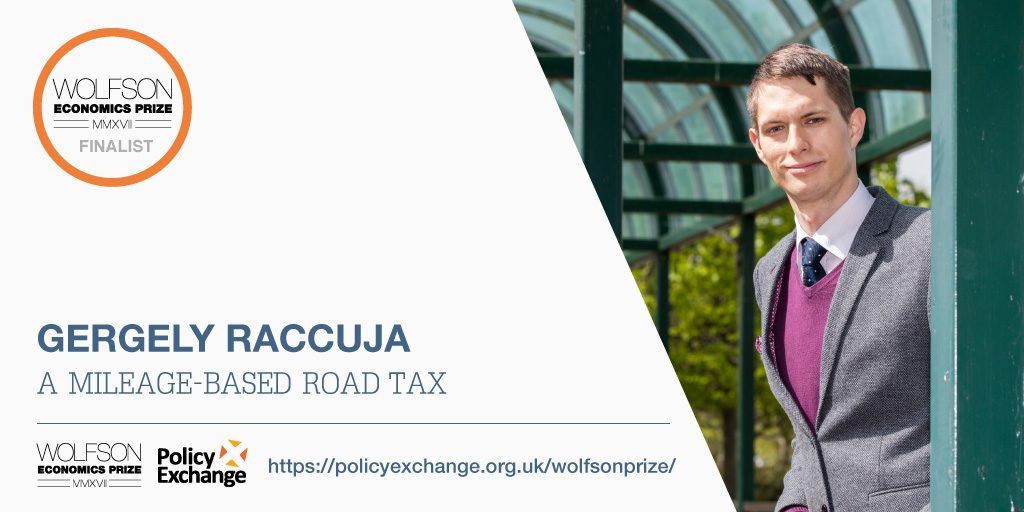
Download Full Submission
Gergely proposes scrapping the two main existing taxes on road use, VED and fuel duty, and replacing them with a fairer system that charges people depending on the distance they drive each year and the type of vehicle they own. To keep things simple, and avoid the privacy and technical complications of road pricing, the new tax will be collected through car insurance companies. Overall, drivers would not pay more – meaning many people would gain – and as road use increases there would be more money available for investment, including a guarantee that some of the money would be spent on local roads in the taxpayer’s area. As new vehicle technology becomes commonplace, the system could adapt.
His big idea
Keep it simple, keep it fair.
Biography
Gergely Raccuja was born in Budapest, Hungary. He read Politics, Urban Planning and Italian at UCL, graduating in 2015 with First Class Honours. In January 2016, he started as a Graduate Transport Planner at Amey Consulting in Birmingham. He has a keen interest in the role that technology will have in shaping the future of transport.
Lightbulb Awards
The judges also recognised two entries with “Lightbulb Awards” for originality. Full details on the two Lightbulb Award winners can be found below (click + to expand details):
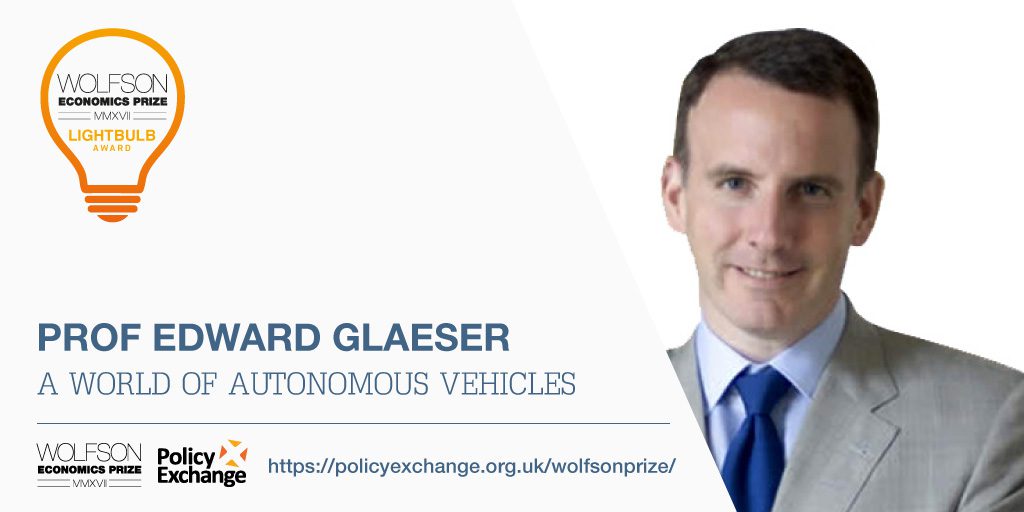
Professor Glaeser argues that autonomous vehicles are coming – and are part of the answer to a congested and underfunded road network. The transition will take time – and be done in different ways in different places – but as automation makes driving easier people will move from old forms of car ownership. This makes a new form of charging essential – to deal with more traffic – and it makes it practical too. There could be special lanes on main roads for autonomous vehicles and new ways of charging trucks.
His big idea
Let technological change solve the policy problem.
Biography
Edward Glaeser is the Fred and Eleanor Glimp Professor of Economics at Harvard where has taught since 1992. His research focuses on cities, including housing markets, transportation, urban growth and entrepreneurship. His is the author of “Triumph of the City: How Our Greater Invention Makes Us Richer, Smarter, Greener, Healthier and Happier,” and scores of academic papers.
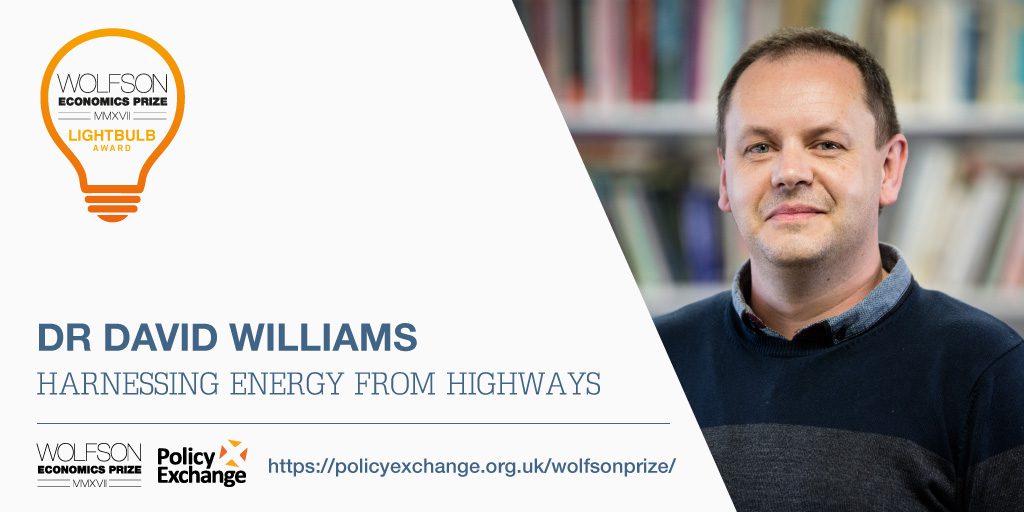
David Williams advocates that roads can do more than just provide a place to travel. If they could generate power, they could earn money to fund their repair and expansion. New technology means this isn’t fantasy: it’s practical and being tested already. Roads can be used to make solar electricity – they are warmed by the sun which is why tarmac can melt on hot days. A system of heat pumps could extract the energy to produce power (and be used in winter to melt ice). Systems making power from rain water and kinetic energy should be tried, too. Combining different sources of power could make this affordable and consistent. Little things will add up to a lot.
His big idea
Roads could keep the lights on and batteries charged up.
Biography
David works as a Research Associate in the Centre Sustainable Planning and Environment at UWE. He completed his PhD at UWE in 2015 and his research designed a sociological model to understand how the transport planning system locks us into unsustainable patterns of travel behaviour.

